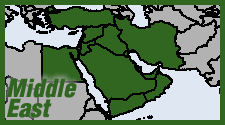 The arch-puritanical rulers of Saudi Arabia can't be happy about this. A Saudi border patrol ship intercepted a boat loaded with a half-ton of hashish bound for the kingdom's shores on the Persian Gulf Sept. 6—after an exchange of fire with the crew, in which two of the smugglers were shot, one fatally. The three surviving traffickers, identified as Iranian, were taken into custody, along with 552 kilograms of hashish. (Saudi Gazette, Sept. 11; Arab News, Sept. 8)
The arch-puritanical rulers of Saudi Arabia can't be happy about this. A Saudi border patrol ship intercepted a boat loaded with a half-ton of hashish bound for the kingdom's shores on the Persian Gulf Sept. 6—after an exchange of fire with the crew, in which two of the smugglers were shot, one fatally. The three surviving traffickers, identified as Iranian, were taken into custody, along with 552 kilograms of hashish. (Saudi Gazette, Sept. 11; Arab News, Sept. 8)
Nor is this the first such incident. Saudi authorities back in March seized some 250 kilograms of allegedly Iranian-made hashish at the kingdom's borderwith Yemen. The packs—apparently being smuggled in by a Saudi border guard—were reportedly found with Persian phrases written on them indicating varieties of hashish. (Yemen Fox, March 11)
There is little doubt that the origin point for this hash is actually Afghanistan, and that a new transit route has opened through Iran. But the traditional route through the Khyber Pass to Pakistan is certainly still flourishing. Pakistan's Frontier Corps on Sept. 10 seized 150 sacks of hashish being carried on a camel convoy in the Khyber Tribal Agency along the Afghan border. Five Afghan men overseeing the caravan were arrested. Five days earlier, Pakistani border guards in Baluchistan province seized approximately 120 kilograms of hashish and seven kilos of opium from the hidden cavities of a car that was apparently making its way from Quetta, near the Afghan border, to the seaport of Karachi. (Pakistan Observer, Sept. 13; The Nation, Pakistan, Sept. 5)
The apparent construction of an Iranian connection casts an ironic light on the recent findings of the UN Office on Drugs and Crime (UNODC) that the amount of farmland in Afghanistan planted with cannabis fell by nearly a fifth last year—but that a bumper crop meant that actual production rose compared with 2011! Nearly 25,000 acres of Afghan land was used to grow cannabis in 2012, a 17% decrease compared to 2011—largely due to eradication efforts in central Uruzgan province, a key Taliban stronghold. (See map.)
Overall cannabis production, however, jumped 8% from the 2011 figure. The cannabis sector is still booming; UNODC found that cannabis growing in Afghanistan last year yielded a potential $6,400 per hectare for Afghan farmers—exceeding the $4,600 per hectare for opium. (The Guardian, UPI, Stars & Stripes, UN News Centre, Sept. 10)
This is pretty nice irony, all around. The Taliban in their years in power were even more puritanical than the Saudis, and hash-smokers were publicly flogged. Now that they are in insurgency, however, they've turned to the dope trade to subsidize their guerilla war—just as the Northern Alliance did before them. And a crackdown on opium-growing has only led to a boom in the cannabis sector. Over the years, the Saudis have funded the Taliban covertly—and, during their years in power, not so covertly. The Taliban and their Saudi patrons alike see Iran as their bitter enemy because of the Sunni-Shi'ite divide. But now the Taliban insurgents are evidently cooperating with Iranian traffickers and (we may assume) corrupt border officials to get their product to international markets—a heartwarming example of free trade overcoming ancient religious hatreds.
And the Iranians are evidently perfectly fine with selling the product within the Desert Kingdom—where repeat offenders can still get beheaded for drinking acohol, let alone smoking hash. (See Drug War Chronicle, Feb. 8, 2008) But count on Saudi authorities and media to play up the Iranian smugglers in the new hashish menace, and totally overlook the Taliban producers...
Cross-post to High Times







Recent comments
3 weeks 3 days ago
3 weeks 3 days ago
6 weeks 4 days ago
7 weeks 3 days ago
11 weeks 3 days ago
15 weeks 2 days ago
19 weeks 2 days ago
20 weeks 19 hours ago
30 weeks 19 hours ago
34 weeks 1 day ago